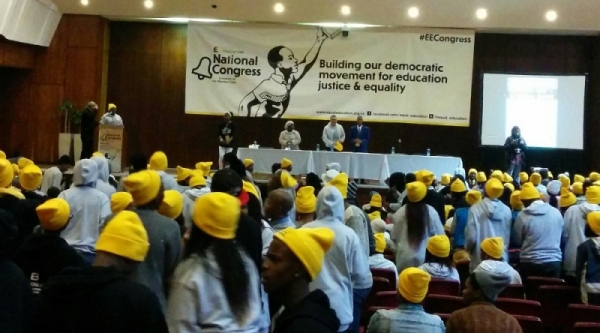“Teachers suffer as we suffer. But we need to hold them accountable,, Dwane tells education activists

Equal Education members from across the country gathered at the opening ceremony for the organisation’s second triennial National Congress on Saturday. The main theme of the four-day event underway at the University of the Western Cape in Bellville is “Building our democratic movement for education justice and equality.”
During the congress, members of the organisation will be discussing various topics, along with the election of a new national council to lead the organisation for the next three years.
The great Hall at UWC was filled with a sea of yellow beanies as about 600 members sang and danced to mark the commencement of the event. At 7pm, about an hour later than scheduled — about standard for civil society congresses, and still eight hours more on time than last week’s Western Cape ANC congress — the event started.
Buhle Booi, the organisation’s deputy-chair described the organisation’s campaigns which have had some success, such as compelling the national government to start ensuring that school infrastructure meets minimum norms and standards, convincing the Western Cape government to fix the broken windows in a school, and highlighting the lack of libraries in formerly black schools across the country.
Booi said that Equal Education had 4,000 members in the five provinces in which the organisation was active.
Although mostly comprised of school students, there was a sprinkling of parents in the audience too. One of them, Rita Pilusha, addressed the congress and called for more parent involved in education.
Equal Education chairperson Yoliswa Dwane spoke about teaching problems in school. She said that some teachers don’t understand the curricula they teach. “How do we deal with this,” she asked? She called on “good” teachers to work with the organisation, but condemned teachers who abuse students, or come drunk or late to school. She said Equal Education should not alienate teachers who share the struggle of students, but still hold those accountable who disregard the profession. “How can we draw our teachers into the movement? They suffer as we suffer. But we need to hold teachers accountable as well,” she said.
National Council member and veteran political activist Zackie Achmat said that Equal Education was having an impact on the public’s perception of education. He began his speech by asking for a moment of silence for the victims of the Marikana massacre. Referring to Lonmin, the company whose workers were killed, he condemned corporate lawlessness. He described the recently released Farlam report as appalling “because it did not speak truth to power.” What kind of education will the children of the Marikana miners get, he asked. He encouraged the organisation to promote a collection drive at schools for the families of the Marikanna miners on 16 August.
Achmat said, “There are two main groups that carry the burden of injustice, poverty and inequality in this country. The first are women which is why it is important that Equal Education sets the foundation and creates a non-sexist country. The second group is young men who are unemployed and unable to pay lobola or provide for their families. This is why we are seeing people kill other African people.”
A continuing theme through the opening ceremony was the dire state of sanitation in schools. Two videos were shown, which contained graphic photos of grotesque school toilets.
The Congress continues until Wednesday. The programme can be downloaded from Equal Education’s website.
Next: Mining - coming to a protected area near you
Previous: Murder on Long Street: Congolese bouncers and the private security industry

This article is licensed under a Creative Commons Attribution-NoDerivatives 4.0 International License.


